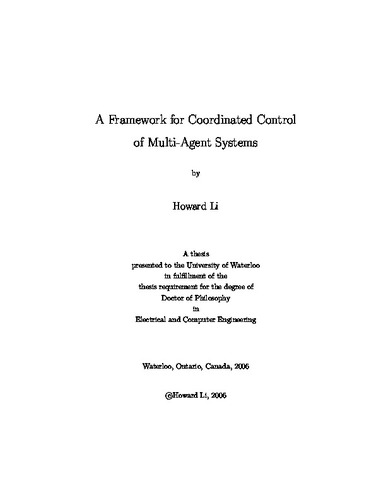| dc.contributor.author | Li, Howard | en |
| dc.date.accessioned | 2007-05-08 13:19:20 (GMT) | |
| dc.date.available | 2007-05-08 13:19:20 (GMT) | |
| dc.date.issued | 2006 | en |
| dc.date.submitted | 2006 | en |
| dc.identifier.uri | http://hdl.handle.net/10012/2791 | |
| dc.description.abstract | Multi-agent systems represent a group of agents that cooperate to solve common tasks in a dynamic environment. Multi-agent control systems have been widely studied in the past few years. The control of multi-agent systems relates to synthesizing control schemes for systems which are inherently distributed and composed of multiple interacting entities. Because of the wide applications of multi-agent theories in large and complex control systems, it is necessary to develop a framework to simplify the process of developing control schemes for multi-agent systems. <br /><br /> In this study, a framework is proposed for the distributed control and coordination of multi-agent systems. In the proposed framework, the control of multi-agent systems is regarded as achieving decentralized control and coordination of agents. Each agent is modeled as a Coordinated Hybrid Agent (CHA) which is composed of an intelligent coordination layer and a hybrid control layer. The intelligent coordination layer takes the coordination input, plant input and workspace input. After processing the coordination primitives, the intelligent coordination layer outputs the desired action to the hybrid layer. In the proposed framework, we describe the coordination mechanism in a domain-independent way, as simple abstract primitives in a coordination rule base for certain dependency relationships between the activities of different agents. The intelligent coordination layer deals with the planning, coordination, decision-making and computation of the agent. The hybrid control layer of the proposed framework takes the output of the intelligent coordination layer and generates discrete and continuous control signals to control the overall process. In order to verify the feasibility of the proposed framework, experiments for both heterogeneous and homogeneous Multi-Agent Systems (MASs) are implemented. In addition, the stability of systems modeled using the proposed framework is also analyzed. The conditions for asymptotic stability and exponential stability of a CHA system are given. <br /><br /> In order to optimize a Multi-Agent System (MAS), a hybrid approach is proposed to address the optimization problem for a MAS modeled using the CHA framework. Both the event-driven dynamics and time-driven dynamics are included for the formulation of the optimization problem. A generic formula is given for the optimization of the framework. A direct identification algorithm is also discussed to solve the optimization problem. | en |
| dc.format | application/pdf | en |
| dc.format.extent | 3675131 bytes | |
| dc.format.mimetype | application/pdf | |
| dc.language.iso | en | en |
| dc.publisher | University of Waterloo | en |
| dc.rights | Copyright: 2006,
Li, Howard. All rights reserved. | en |
| dc.subject | Electrical & Computer Engineering | en |
| dc.subject | multi-agent systems | en |
| dc.subject | control | en |
| dc.subject | hybrid systems | en |
| dc.subject | framework | en |
| dc.title | A Framework for Coordinated Control of Multi-Agent Systems | en |
| dc.type | Doctoral Thesis | en |
| dc.pending | false | en |
| uws-etd.degree.department | Electrical and Computer Engineering | en |
| uws-etd.degree | Doctor of Philosophy | en |
| uws.typeOfResource | Text | en |
| uws.peerReviewStatus | Unreviewed | en |
| uws.scholarLevel | Graduate | en |

